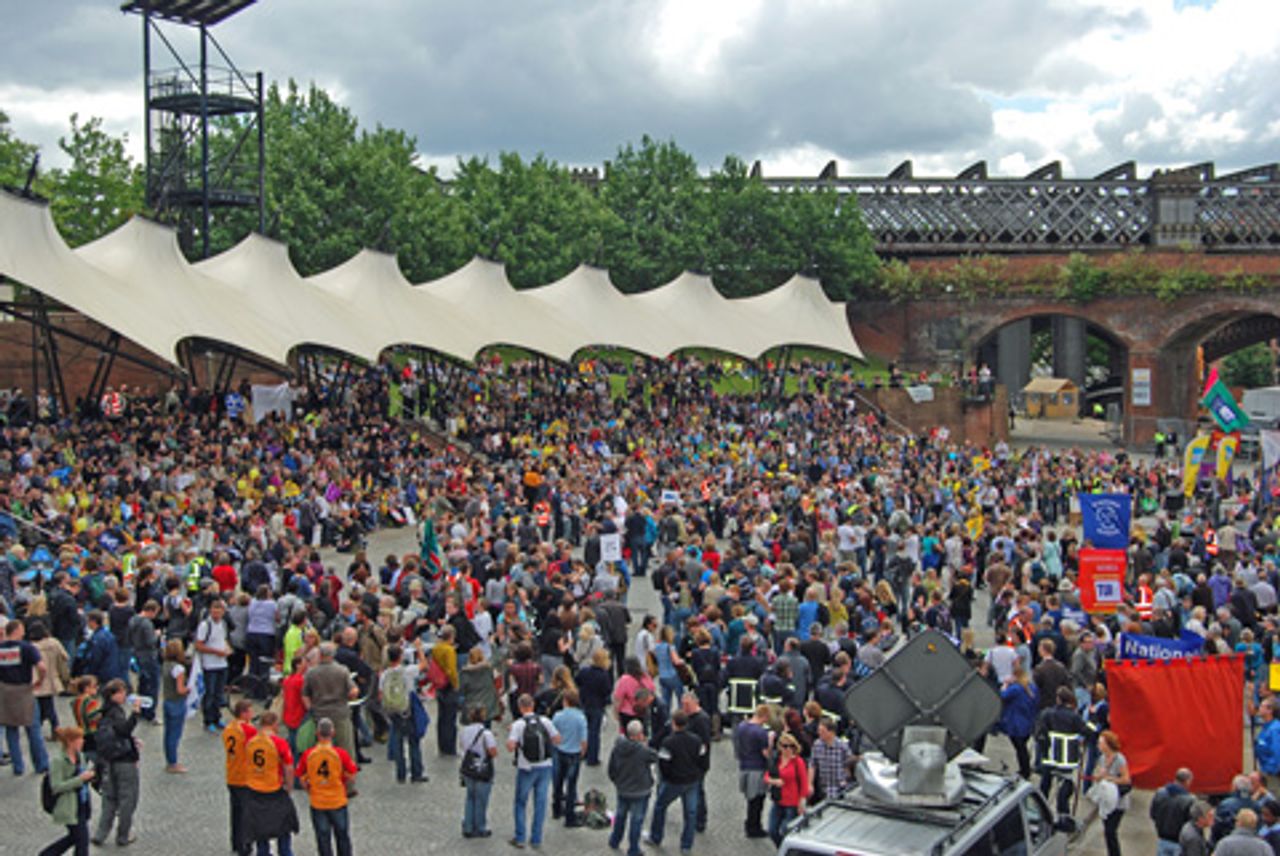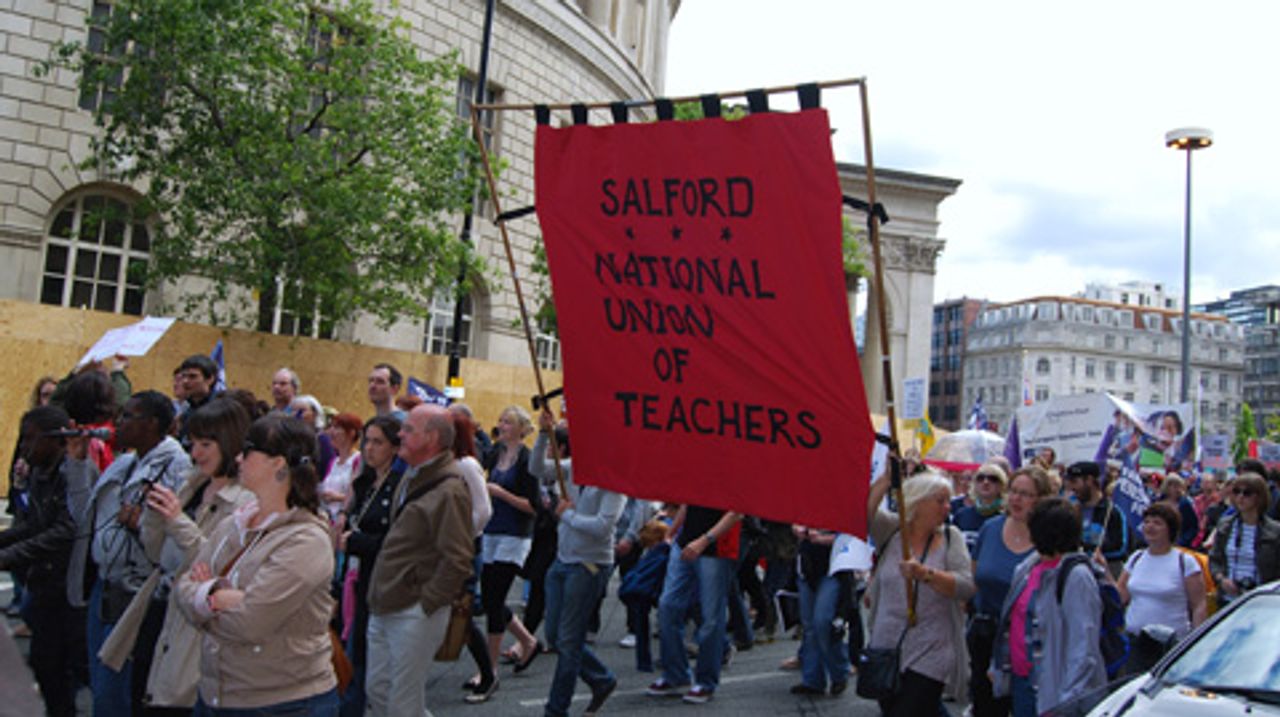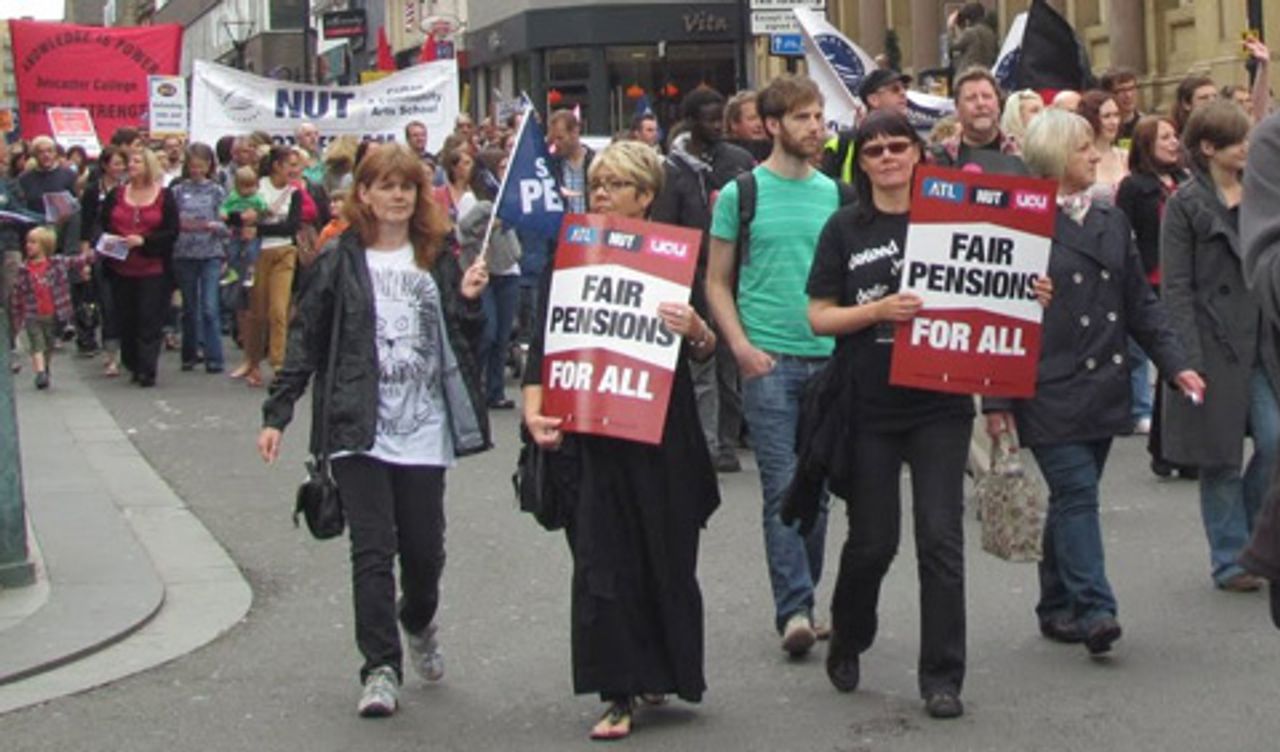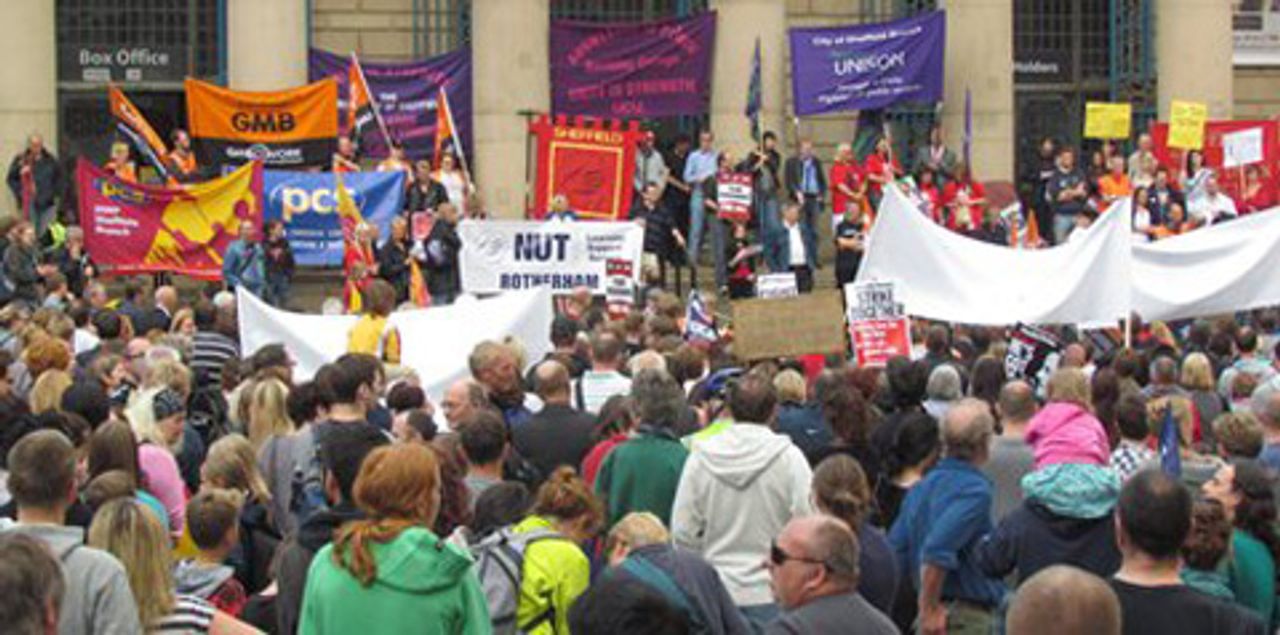Between half a million and 750,000 public sector workers staged a 24-hour strike on Thursday against the coalition government’s attack on their pension scheme. The Conservative-Liberal Democrat government intends to raise the state pension age, increase employee contributions and link pension values to the generally lower consumer prices index (CPI) rather than the retail prices index (RPI).
 Demonstration in Manchester
Demonstration in ManchesterAround 5.5 million workers are affected by the plans, which are part of the government’s efforts to impose the greatest austerity measures since the 1930s.
The government denounced the action, claiming that negotiations were still ongoing. This is despite the fact that the coalition has stressed the changes are non-negotiable. It was backed by a media campaign attacking those on strike as “selfish” and “greedy”.
The Labour Party leadership also attacked the strike. The Trades Union Congress (TUC) played its role in attempting to isolate the action—the first such national strike since the coalition took office 13 months ago. The major public sector unions did not take part, anxious to prove to the government that they can be relied on to try to stifle any opposition to its measures. The GMB even endorsed strikebreaking, saying it was “up to individuals and their consciences” about whether they choose to cross picket lines.
This meant that the strike was confined to four of the smaller unions in the public sector—the National Union of Teachers, Association of Teachers and Lecturers, University and College Union, and the Public and Commercial Services (PCS) union. All of these are led in the main by the ex-left groups such as the Socialist Party and Socialist Workers Party, who are all too aware of the widespread alienation of millions of working people from the political establishment and the TUC.
The action confirmed their concerns. Kevin Courtney, deputy general secretary of the NUT, said about 85 percent of schools were affected—17,000—as well as nurseries. The Department of Education said only 25 percent were disrupted, but this is not credible. An earlier survey by the education department of 5,412 schools found 3,206, 60 percent, expected to be closed, and that those remaining open would not be fully staffed. In addition, 350 colleges and 75 universities suffered “significant disruption”, despite the protest backed by the UCU taking place on a non-teaching day.
Mark Serwotka of the PCS, which organises 250,000 civil servants, said it was the “best supported strike we’ve ever had,” with 90 percent of members in the Department of Work and Pensions and 85 percent of HM Revenue and Customs out. Job centres and welfare advices call centres were closed. Customs staff at airports and ports also struck. There were long delays at airports, but no reported cancellations.
A number of trials were postponed and many museums closed.
The Metropolitan Police confirmed that 9 out of 10 staff handling 999 emergency calls struck, forcing officers to be redeployed. Police leave was cancelled in London, where a march took place followed by a lunchtime rally at Methodist Central Hall, Westminster.
Just as significantly, various opinion polls recorded a majority of people in favour of the strikes. The implications of this are of particular import, under conditions in which the Labour Party leadership joined in the attack on the strikes.
 Section of marchers in Manchester
Section of marchers in ManchesterLabour leader Ed Miliband wrote on his blog that the walkouts were “a mistake” and “should not go ahead”. Faced with the prospect of pickets outside every Whitehall department in central London as well as at government offices and schools up and down the country, a spokesman for Miliband said Labour MPs would cross picket lines and “come to work as normal”.
John McDonnell, the putative leader of the Labour “left” who is backed by the PCS, politely called on Miliband “to do what is right” and said he was “disappointed” by his response. But this meant that the efforts of the various ex-left groups to use the action to promote the Labour Party at local and regional rallies met with a decidedly lukewarm response.
Socialist Equality Party members and supporters intervened on a number of demonstrations in London, Manchester, Liverpool, Sheffield, Leeds, Bristol, Peterborough and Bournemouth.
In London, Gemma Turton, a teacher from Burdett Coutts CE Primary School, wanted to know why the government wouldn’t give actual figures showing why they had to cut the pensions. “It makes me think that they just want to make cuts, to get rid of public services and go after pensions. In the NUT magazine, they show that the bankers’ bonuses would pay for the public sector cuts. But we are having to pay for their mistakes.
“The media has just made teachers look like money grabbers. They don’t take into account the amount of unpaid overtime we do. We get long holidays, but we spend a percentage of them working. I will be working a lot of the weekend.
“The reporting has been anti-teacher—all about how children can’t read and write and how the teachers’ pension is crippling the economy. They never say anything positive about teachers. In many cases, teachers are practically bringing up children who come into schools not toilet-trained and with minimal social skills.”
 March in Sheffield
March in SheffieldThere was a massive police presence at the march. Hanan Wahabi from Edward Wilson Primary School in Westminster told the WSWS, “Police suddenly grabbed a boy of about 15 who was wearing a lightly coloured hoodie from the middle of the march with no warning. He was shocked and pulled away and they dragged him off the march to the other side of the road. His mum, who was holding a banner, said it was her son, but they took no notice. People were taking photos and the police were trying to stop them.
“It is good that about 93 percent agreed to strike, but honestly, my heart says that it will achieve nothing. I would like to think that it will, but the government know what they want and the negotiations are fake. Why should they take our pension away because private companies don’t have them? We should be equal. They should get what we get. We all pay enough tax. The rich are getting richer, and the poor poorer.”
Agnieska and Hayat, also from Edward Wilson, said, “It is good to see how united everyone is. We hope it will make a difference, but we will need more strikes.”
Agnieska continued, “The government has to know that we won’t back down and parents need to stop listening to the media. This is for the children too, so if they want to come into the teaching profession in the future, they will have a decent pension.”
Nick McIvor, an Advanced Skills Teacher in Maths, from St Marylebone C.E. Girls’ School in Westminster, said, “The most depressing thing happening in education now is the fragmentation. When people are separated and threatened, they tend to scapegoat a section, which is why the far right is getting support.
“This strike is a necessary bargaining ploy by the unions. We have to make our presence known. If you do nothing it looks like we are soft.”
At the Manchester rally, speakers claimed a turnout of over 5,000. All made bellicose noises about winning “this fight”. Sue Bond, vice president of the PCS, claimed that the government could be forced into a “u-turn.”
UNITE’s executive member for the North West, Tony Wilson, similarly urged the government to change its position, “Otherwise we will be on strike with you later this year.” The day before, UNITE called off a ballot of its members to strike on the pretext of holding more negotiations with the government.
When a letter of support from the TUC was read out, one of the many firemen present said to our reporters, “If they wait for that lot to move, we will all be on the dole”
A young teacher expressed concern that there was nothing “concrete from the meeting. Lots of fiery speeches and it was good to show unity in the profession. But we expected to be told what was going to happen next”.
Another teacher laughed at the petition that was being passed around: “Cameron and the government won’t take a blind bit of notice to that.”
In Sheffield, police prevented 1,500 demonstrators from gathering at the original assembly point in the Peace Gardens adjacent to the Town Hall, shielding the newly elected Labour council from criticism.
As elsewhere, there was a celebratory and determined mood. The protest was used as a platform to mount a defence of the Labour Party and the inaction of the majority of trade unions over the attacks on pensions. Speakers from the FBU, Unite, GMB and UNISON were allowed to make demagogic speeches about taking the fight to the coalition government, while in practice refusing to even participate in the limited strike action by the three teachers’ unions and the PCS. The speaker from Yorkshire and Humberside TUC stated that the cuts had been necessitated by the bailout of the banks, but claimed that this had nothing to do with the last Labour government! Many speeches referred vaguely to the possibility of further strikes or protests until the coalition government is replaced by Labour.
 Rally in Sheffield
Rally in SheffieldThose interviewed by the WSWS were not convinced by such a scenario. Kirsty Anderson, who is unemployed after her Future Jobs Fund position came to an end, told our reporters, “I came down to find out more about what people are doing politically, about the realisation that the system is not working and talk to some interesting people about what they were thinking about in terms of the way forward, because I cannot see one myself.
“I think the austerity measures and attacks on pensions are a symptom that our current system is unsustainable. The public sector is being used as a scapegoat. I was training as a baker, but was laid off once because the bakery went bankrupt and then a second time when a bakery could not afford to train me.
“As far as I can see there are no alternatives; the political parties are peddling the same old messages again and again, trying to continue a system that is feeding the very rich at the expense of everyone else. I used to work for a supermarket, and joining the union was part of the deal. I thought they would financially support people that were on strike and provide financial aid against injustice. But I am beginning to wonder if that is true.”
In Bristol, around 2,000 to 3,000 people attended the demonstration including many young non-unionised people and students supporting their teachers and lecturers.
One of the opening statements from the platform was “Today is not about bringing down the government”. When the local Labour Party bureaucrat addressed the rally, sections of the crowd booed him.
A teacher said, “It’s a great one-day strike, and I support the plan for ongoing strikes. It’s important that as many unions and people as possible are on the streets, showing solidarity. This government has no mandate to carry out these attacks.
“It is shocking that the Labour Party don’t support the industrial action, and they should be ashamed”, she said, adding that what was required was “a radical Labour government with a socialist agenda.”
Another teacher explained, “Only 2 members out 14 from my school are on strike. The rest are in the NASUWT, who were not even balloted and are working today.
“The media coverage will be awful. We won’t hear the truth. We live in frightening times. I am not impressed with the Trades Union Congress and I don’t support the Labour Party.”
In Peterborough, after some platform speakers called for Labour members to pressure the local party to censure Miliband, an SEP member intervened. “Attempting to pressure the Labour Party for the last 40 years has achieved nothing,” he shouted.
Several of those in attendance insisted he should be allowed to speak. He told the crowd, “This action takes place in the midst of a huge world economic crisis that the ruling class intends to place on the backs of workers. The treachery of the old leaderships of Labour and the trade unions will be used to disorientate and dismay workers in struggle and to make you feel you can’t continue.
“In recent decades, these organisations have defended nothing for workers…. Rank and file committees must be built, independent of the old organisations, to unite with other workers’ struggles internationally, such as those in Greece and Egypt, and to build a new socialist party.”
Fill out the form to be contacted by someone from the WSWS in your area about getting involved.
